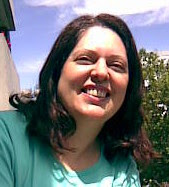Wednesday, 16 December 2009
John Galt
Me? Also terribly disappointed to find out John Galt is an actual character.
Monday, 14 December 2009
Twitter -Day 2, Ayn Rand -round 2
I'm getting a bit better at tweeting -I'm now learning to use TweetDeck, which I find can be a big help to keep track of my tweets, but is not without its perils. For example, I now have quite a few columns that sort out nicely the lists and people I follow, but they don't all fit in the width of my screen...It's great for multitasking (well, bi-tasking) though, so I can now visit websites and
follow tweets. And the feeling of being in a rollercoaster is beginning to go away, as is my problem with the 140-character-limit.
I'm putting the online organisers on hold, because I'm meeting my reading group on Thursday to discuss the work of Ayn Rand (second round) and I'd like to finish Atlas Shrugged. I have to say -almost 20 years apart from Anthem, I feel I can still see stitches. Perhaps she wanted it that way, but if she did, it bugs me that she wrote about the same issues in her non-fiction works. Did she see in the novel the instrument to apply her philosophical theory? She claims in the Romantic Manifesto that she's a Romantic writer because, unlike Naturalists, what's important in her fiction is the plot. I'm inclined to disagree based on what I've read so far.
As for the stitches, to me, Anthem expresses the lack of individual status in a social organization, and Atlas -it seems so far- the emergence of a system where individuality primes and the way of doing business is changing; social bonds don't matter if they don't contribute to business.
Interestingly, while the hero in Anthem -the one that finds his individuality- is a man, the one with nerves of steel for business in Atlas is a woman.
One of the things I'm curious about is whether the poliphony I'm finding now will continue throughout the rest of the novel. It's also interesting that (now that I'm writing I notice) both stories have two strong figures each and that these, in each story, are a man and a woman. It may cease to be interesting -I don't know. And if Anthem reminded me of Shirley Valentine, Atlas takes me back to Albee and Who's afraid of Virginia Woolf?
Who's John Galt?
Saturday, 12 December 2009
I didn't know what to expect, but I liked what I saw: friendly people chatting about their lives -sometimes talking shop, sometimes just saying how they'd spend the evening. It was really like witnessing a face to face conversation. A lot of sharing also seems to go on, which is nice. Someone miles away from you finds something interesting and within seconds is able to share it with you, and you can send back your reaction.
What I'm having a bit of trouble with is, of course, keeping my messages down to 140 characters. I've noticed that abbreviations are not the same -generally speaking- as the ones used in SMS.
The character limit reminded me of mini-sagas. I used to visit a website with nice ones but I've forgotten now. If anyone knows of one, I'll be grateful if you can share it with me.
Another thing my twittering experience made me think of -revise, really- is the concept of multitasking. I can talk on the phone while I watch a series on TV, say goodbye/hi to people in the room and maybe even do some light reading. I can't tweet and follow a conversation at the same time. I can't text and be aware of what's going on around me. Which sets me thinking: is multitasking a skill you get through practice only, or is it also related to the kind of connections your brain has made over the years so that it's more difficult for older people (ehem...) to multitask technologically?
Wednesday, 9 December 2009
What do I put my students through?
Some of them were about to sit international exams where they would not have access to a computer, so I thought it was important for them to at least be aware of some techniques they could resort to in order to organise their writing. I showed them what I could and they paid attention -some of them even tried out the strategies.
Recently I found out that there are online writing organizers and I'm thinking that this could be helpful mainly in two ways: first, they can act as a bridge, with students trying out the organizers in a familiar medium and getting used to exploring the possibilities different organizers have to offer. The transition, I imagine, should be much smoother then. The second advantage I see is that these online organizers can become part of these students' "writer's toolkit" (I think it's a Stephen King phrase), so that when they have to write something in real life that needs planning they'll be familiar enough with the tools to use them without help.
Of course, the next logical step was for me to try out these organizers so I could offer first-hand accounts of the experience. I browsed several websites and, for no particular reason, decided to start with exploratree . There's a wide range of ready-made thinking guides which you can use and adapt, or you can simply create your own.
I tried one of the ready-made ones and liked it. I need practice because I'm really used to using paper and pen, but it felt more natural than I'd expected, and I was able to brainstorm some ideas on a topic that I'd like to include here when it's done. So I'll keep trying and sharing my experience with you.
All in all, it seems promising.



